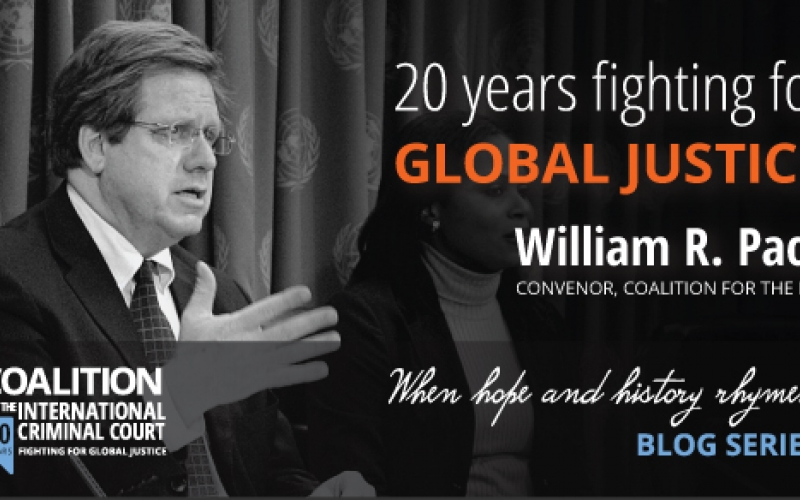20 years fighting for global justice

“History says, Don't hope
On this side of the grave,
But then, once in a lifetime
The longed-for tidal wave
Of justice can rise up
And hope and history rhyme.”
For the last 12 years it has remained a day for commemoration and stocktaking by governments, international organizations, the Court and, of course, civil society. The Coalition of the ICC, a global network of more than 2,500 NGOs from 150 countries that played a key role in the Court’s creation, continues to be one of civil society’s most successful campaigns.
2015 is a milestone year of the United Nations. It is the 70th anniversary of the UN Charter, the founding of the international organization whose first goal is to prevent and end wars – and to replace the rule of force with the rule of law, human rights and justice.
[[{"type":"media","view_mode":"media_large","fid":"858","attributes":{"alt":"Then-UN Secretary-General Kofi Annan and Coalition for the ICC Convenor William Pace at the Rome Conference in 1998. © CICC","class":"media-image","longdesc":"Then-UN Secretary-General Kofi Annan and Coalition for the ICC Convenor William Pace at the Rome Conference in 1998. © CICC","style":"width: 300px; height: 196px;","typeof":"foaf:Image"}}]]
2015 is the 70th anniversary of the Nuremburg Tribunals, whose principles were finally enshrined and extended in the Rome Statute 53 years later, described by supporters and opponents alike as ‘international law-making of historic proportions.’
But, making the law is not the same as getting governments and people to obey and enforce international law.
For the Rome Statute to succeed, we need the 123 governments who have ratified to help secure the ratification of the 70 governments that have not yet done so. We need all governments to adopt national laws and establish national institutions that can investigate and prosecute anyone responsible for committing the world’s worst crimes under international law. We need regional international organizations and courts to support the ICC. And, of course, we need the UN, and especially the Security Council, to fully cooperate with the Court and its governing body, the Assembly of State Parties.
Making the ICC succeed is equal to achieving the first goal of the UN Charter. Perhaps, this is why some of the greatest powers, dictators and militarists fear the ICC so much.
Ben Ferencz, a good friend of the Coalition since its founding in 1995, is 95 years old, the last surviving prosecutor at Nuremburg, proclaims to all who will listen that ”’Law, not war’ remains my slogan.” That message should have particularly strong meaning today.
[[{"type":"media","view_mode":"media_large","fid":"859","attributes":{"alt":"Activists demonstrate in support of the ICC outside of the Rome Conference. © CICC","class":"media-image","style":"width: 300px; height: 218px;","typeof":"foaf:Image"}}]]
The advances in international law and justice since the end of the Cold War have been almost revolutionary. But, the wonderful verse from the poet Seamus Heaney that precedes this post illustrates both an inspiration and a caution. I do not think anyone knows how ‘the longed-for tidal wave of justice’ rose up on Friday, July 17, 1998; but it did. It is certain that if we—the prevailing majority of the international community—had not risen up then, the entire effort would have failed. And, at no time in the last 17 years could we have achieved even a fraction of what was adopted.
So today is a day to celebrate, but also remember how long and hard the path to success will be. Last week the world took notice of the 20th anniversary of the Srebrenica genocide. It took many years to capture and bring to justice the key political and military leaders who ordered those crimes. The Cambodia, Sierra Leone, Rwanda and Yugoslavia tribunals are all coming to an end. But, the ICC remains as the permanent Court. There have been and will continue to be many critics of the ICC and international justice. All of the international courts have had failures and successes, including the ICC. The Coalition for the ICC is dedicated to helping the Court embrace all the ‘lessons-learned’ from the last 20 years.
The Coalition for the ICC also is celebrating its 20th anniversary throughout the next year leading up to the formal dedication of the Court’s permanent premises next July in The Hague. Our Coalition remains committed fighting the long, hard struggles described above to make the ICC succeed.
It is left for all of us to make “hope and history rhyme.”
This post is the first of our “When hope and history rhyme" blog series, commemorating the 20th anniversary of the Coalition for the ICC. Throughout the next year, we will feature posts from Coalition staff, civil society members and officials reflecting on 20 years of fighting impunity, lessons learned and challenges for the future of global justice.
